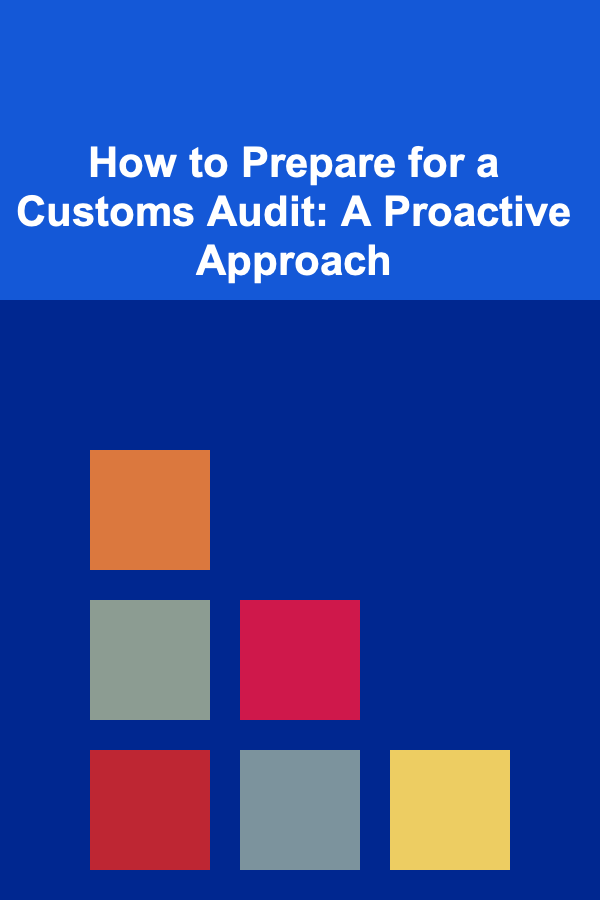
How to Prepare for a Customs Audit: A Proactive Approach
ebook include PDF & Audio bundle (Micro Guide)
$12.99$9.99
Limited Time Offer! Order within the next:

Customs audits are a routine yet critical part of global trade. For businesses that import or export goods, ensuring compliance with customs regulations is vital to avoid costly fines, penalties, or even the suspension of operations. While it's always preferable to remain compliant throughout the year, it's essential to prepare for a customs audit proactively to minimize risks and enhance operational transparency.
In this article, we will explore a proactive approach to preparing for a customs audit. We will cover everything from understanding the customs audit process to implementing preventive measures and preparing your business to respond effectively when an audit occurs. By the end of this guide, you will be equipped with the knowledge and tools necessary to handle a customs audit with confidence and ease.
Understanding Customs Audits
A customs audit is a process where customs authorities review a company's records and operations to ensure that it is in compliance with all applicable laws, regulations, and tariffs. This includes verifying the accuracy of the declared value of goods, classifications, duties paid, and other elements related to the import or export process.
Customs audits typically take place when customs authorities suspect that there may be discrepancies in the business's records or that there are potential violations of the law. Audits are also conducted randomly, and companies that consistently import or export large quantities of goods may be more likely to face a customs audit.
Key Areas of Focus During a Customs Audit
- Classification and Valuation of Goods: One of the most common issues raised during audits is the misclassification or undervaluation of goods. Customs authorities will ensure that the classification and value of goods are accurate and reflect the correct tariff codes.
- Tariffs and Duties: Customs will review whether the business has paid the appropriate tariffs and duties on imported goods. This includes examining how duties were calculated and whether any exemptions or reductions were applied correctly.
- Recordkeeping and Documentation: Auditors will inspect the company's records to ensure that they maintain accurate and complete documentation. This includes invoices, bills of lading, customs declarations, and other supporting documents.
- Compliance with Trade Agreements: If a business benefits from preferential trade agreements, the audit will verify whether the company has complied with the terms and conditions of these agreements.
- Import and Export Controls: Auditors will check whether the company adheres to export control regulations and any embargoes or restrictions on certain goods or destinations.
Why Proactive Preparation Is Important
Preparing for a customs audit in advance is crucial for several reasons. The customs audit process can be stressful, time-consuming, and costly, especially if your company isn't well-prepared. Being proactive helps ensure that:
- You avoid penalties and fines: A well-prepared company is less likely to face penalties for non-compliance. By taking the right steps before the audit, you reduce the chances of incurring costly fines.
- You reduce audit duration: A disorganized or unprepared audit will take longer, disrupting your business operations. Proper preparation can help streamline the process, saving both time and money.
- You minimize the risk of legal action: Serious violations uncovered during a customs audit could result in legal consequences, including suspension of operations or even criminal charges in extreme cases.
- You improve overall compliance: A proactive approach helps to identify compliance issues before they become larger problems. It also allows your team to stay up-to-date on changes in regulations.
Steps for Preparing for a Customs Audit
1. Understand the Audit Process
Before you can properly prepare for a customs audit, it's essential to understand the process itself. Generally, a customs audit follows these basic steps:
- Notification of the Audit: You will be informed by the customs authority that you are being audited. This notification will typically include the scope and objectives of the audit.
- Review of Documentation: Auditors will ask for specific documents and records related to your imports, exports, and trade activities. These documents will be reviewed to ensure accuracy and compliance.
- Interviews and Site Visits: In some cases, auditors may interview employees involved in import/export operations or conduct site visits to verify business operations.
- Assessment and Reporting: Following the review, auditors will assess whether there have been any violations of customs regulations. You will then receive a report detailing the findings and any penalties or corrective actions.
- Resolution: If violations are found, you will be given the opportunity to resolve the issues, pay any fines, and rectify any deficiencies in your compliance procedures.
2. Review and Update Your Customs Compliance Program
One of the first steps in preparing for a customs audit is to ensure that your customs compliance program is up to date. This program should include:
- Internal Policies and Procedures: Review your company's internal policies and procedures related to customs compliance. Make sure they are aligned with current customs regulations and best practices.
- Staff Training: Ensure that employees involved in customs operations, such as import/export managers and finance teams, are well-trained in customs regulations and internal procedures. Regular training will help mitigate human errors that could lead to non-compliance.
- Use of Technology: Consider implementing software or tools designed to manage customs documentation, track shipments, and help with classification and valuation of goods. This will reduce errors and streamline your processes.
3. Organize and Maintain Records
Good recordkeeping is critical when preparing for a customs audit. Make sure that all required documentation is organized, up-to-date, and easily accessible. Key documents include:
- Commercial Invoices: Ensure that your commercial invoices are accurate and provide complete details about the transactions, including the value of goods, quantity, and origin.
- Bills of Lading and Shipping Documents: Maintain complete records of your shipping documents, such as bills of lading, packing lists, and import/export declarations.
- Customs Declarations: Your customs declarations should accurately reflect the nature of the goods being imported or exported, along with the correct tariff classifications and valuation.
- Trade Agreements: If applicable, ensure that documentation related to preferential trade agreements or free trade agreements (FTAs) is correctly maintained.
- Payment Records: Keep track of all payments made to customs authorities, including duties and taxes, as well as any rebates or exemptions.
4. Conduct an Internal Compliance Audit
Before the customs authorities arrive, it's a good idea to conduct an internal audit to identify any potential issues. This internal audit can help you find discrepancies before the official audit and give you time to fix them.
- Review Customs Declarations: Check that your goods are classified correctly, and that the declared value is accurate. Ensure that the tariff codes align with the nature of your products.
- Cross-Check Records: Compare your records with your import/export activities to ensure they match. Look for any discrepancies, such as missing or incorrect invoices.
- Evaluate Duty Payments: Verify that the correct duties and taxes have been paid and that the appropriate methods were used to calculate them.
- Assess Trade Agreement Compliance: Ensure that any preferential tariffs or exemptions applied are supported by the necessary documentation.
5. Develop a Response Plan
It's essential to have a clear response plan in place in case discrepancies are found during the audit. The plan should include:
- Designating Key Personnel: Identify a team of key personnel who will be responsible for managing the audit process. This should include your customs compliance officer, finance director, and legal team.
- Preparing for Questions: Prepare answers to potential questions the auditors may ask. This could include inquiries about your customs valuation methods, classification procedures, and any trade agreements you rely on.
- Focusing on Cooperation: Approach the audit with a cooperative mindset. Provide requested documents and information in a timely and transparent manner. Be open to suggestions or recommendations from the auditors.
6. Maintain Communication with Customs Authorities
During the audit, maintain open communication with the customs authorities. If any issues arise, promptly address them and provide explanations or documentation where necessary. Avoid being defensive or dismissive, as this could create tension and lead to further scrutiny.
7. Correct Issues and Implement Improvements
If the audit uncovers any non-compliance issues, take immediate steps to resolve them. This may involve paying fines, revising records, or correcting internal procedures. Additionally, consider implementing new systems or practices to prevent similar issues in the future.
Conclusion
Preparing for a customs audit is an essential part of global trade compliance. By taking a proactive approach, you can minimize the impact of the audit, ensure that your business remains compliant with customs regulations, and avoid unnecessary penalties or fines. With a thorough understanding of the audit process, a strong internal compliance program, and good recordkeeping, you'll be well-positioned to handle any customs audit that comes your way.
By remaining vigilant and continuously improving your customs practices, you not only reduce your risk of violations but also build a stronger, more transparent business capable of adapting to ever-changing global trade requirements.
Reading More From Our Other Websites
- [Organization Tip 101] How to Organize Your Luxury Sports Equipment
- [Home Pet Care 101] How to Train Your Dog to Use a Dog Door
- [Personal Care Tips 101] How to Use Hair Oil to Add Volume to Fine Hair
- [Simple Life Tip 101] How to Adopt a Minimalist Pet Care Routine That Keeps Both Owner and Animal Happy
- [Home Party Planning 101] How to Handle Party Emergencies Like a Pro: A Guide to Last-Minute Solutions
- [Home Security 101] How to Increase Home Security Without Changing the Aesthetic
- [Polymer Clay Modeling Tip 101] How to Choose the Perfect Polymer Clay Color Palette for Your Accessories
- [Organization Tip 101] How to Incorporate Storage Benches into Your Patio Design
- [Small Business 101] Top Small Business Accounting Software for 2025: Best Picks for Entrepreneurs
- [Personal Investment 101] The Future of Passive Income in Deep Learning and AI

How to Create a Family Snack Station in Your Pantry
Read More
How to Create a Garden Tool Loaning System
Read More
How to Create a To-Do List That Actually Works
Read More
How to Secure Your Garage Against Break-ins
Read More
How to Stage Your Home When Living in It
Read MoreHow to Identify and Correct Errors in Your Investment Performance Tracking
Read MoreOther Products

How to Create a Family Snack Station in Your Pantry
Read More
How to Create a Garden Tool Loaning System
Read More
How to Create a To-Do List That Actually Works
Read More
How to Secure Your Garage Against Break-ins
Read More